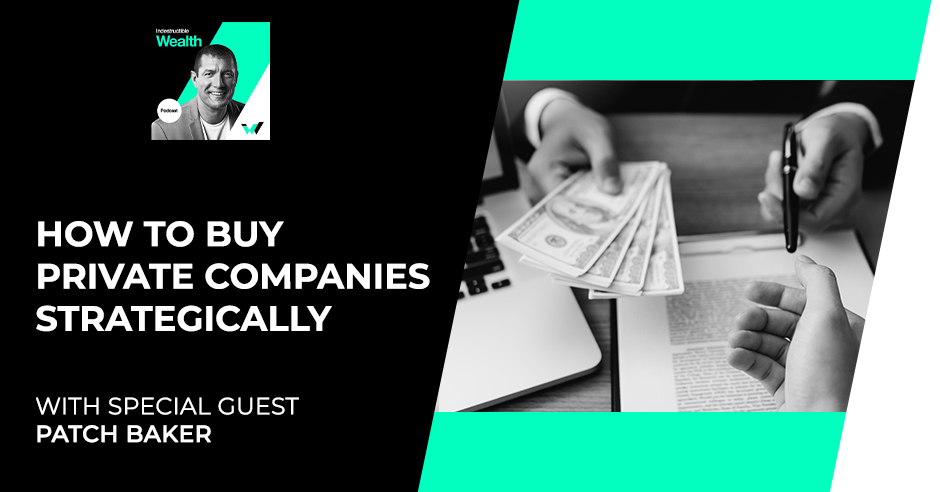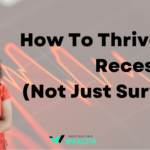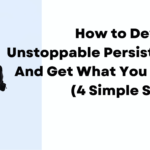
When Patch Baker left the Marines at age 35, after enlisting at 17, he felt like a fish out of water. He didn’t even know what HR was.
Now, he is the owner of more than 100 private businesses. Listen and learn how he did it on today’s Indestructible Wealth podcast.
—
Table of Contents
Listen to the podcast here
How to Buy Private Companies Strategically, With Special Guest Patch Baker
I’m excited to announce that I’m finally offering the ability for you to work with me. I know that so many of you, probably every single one of you reading, have been thinking every day when you wake up, “When do I get an opportunity to work with Jack? That fucking guy is so awesome.” Very few of you are thinking that, but I want to give you the opportunity. It is now open. I got two options that you can finally pick my brains on if you’d like to get more in-depth mentoring and coaching.
You go to my website, MyIndestructibleWealth.com, and there’s a tab that says, “Work with Jack.” You click that, and you are going to have two options. There’s going to be a one-on-one, and you can book a call with me. If you want to book a single, “I want to pick your brain for an hour and see if I’m on the right track, bounce some ideas off you, or talk about some strategies and building my business,” great.
However, I can serve you. I have built four different entities to over $2 million. I have fourteen different, multiple streams of income and a multimillion-dollar portfolio. I’m not telling you that. You guys already know probably all of that. I’m telling you that I know what I’m doing. I have so much to learn, but if you want to pick my brain, do it. If you don’t, keep reading the free content and engaging, and that’s great too. I don’t care. I’m not doing this for the money, as you guys probably are well aware. It’s a passion project.
At the same time, I can’t do things for free. You don’t want to do anything for free either, no matter how much you are passionate about it. Go to the website, click on the link, and follow along. You can watch a video that tells you a little more about the mastermind course I’m offering. That’s a real affordable way for you to get in-depth training on multiple streams of income and debt paydown.
I talk about all kinds of real estate particularly specific opportunities you can do, speculation-type plays like crypto, tech stacks, and pre-IPOs. We are going to talk about retirement accounts. We are going to talk about the fundamentals of investing. We’ll talk about charitable giving on that course. It’s a complete course that will take you quite a bit further in your knowledge of what you need to do to build indestructible wealth.
It’s very action-oriented, and there’s the basic mindset, but it’s not just, “You need to think more positively. You need to work on your mindset.” It’s about how you are thinking about your strategy, and then it’s also specific opportunities that you can take advantage of and start building your own portfolio of assets. If you are interested, hit the website. If you have any questions on that, certainly, you can feel free to email me at [email protected], or you can hit me up on Instagram for direct messaging. I respond to those on a daily. I wanted to let you guys know that.
Welcome back to the show. Sometimes they do solo episodes, and you guys are probably getting tired of those by now because I have had a bunch of those in a row. I managed to track down a special guest for this episode, Patch Baker with the Mobius Company. This is an incredible story you are about to read, where he started, and where he’s at now.
He has flipped over, bought, and repurposed over 105 private businesses to this point. Being that this is an evergreen show, by the time you read this, I’m sure that number will be quite a bit higher. He’s got the style that you are accustomed to with me. You are going to love what he has to say. Patch, thank you so much for being on the show and for your expertise and willingness to share.
You got it. I’m happy to be here.
Start us off. Tell us a little bit about your background, whatever you want to share. Go for it.
I was in the Marine Corps for fourteen and a half years and did a lot of cool stuff there. However, when I got out, they taught me how to be a good Marine. They didn’t teach me how to be a good civilian. I fell on my face after that. I got into marketing and built an agency. It was pretty successful at that, and then I got into the world of acquiring businesses.
My MO is to acquire a company, grow it, scale it, and exit. That’s the gist of what I do. Instead of having a bunch of other clients, I use my own companies as the client list. I have 49 now. I keep acquiring them. We are acquiring about 4 to 5 a quarter or so and keep ramping up. We were talking a little bit before the show that everything is on sale right now.
These are two things that are happening in the marketplace or as business acquisition goes. Everybody wants to sell their company if they are young or if they are old. Everybody in the middle is trying to hang on and scale their business. Those are the people that don’t even know that their business is for sale because, to them, it’s become a job.
They are building a company. They might be a company owner, but it’s a job. That’s their normal routine. Eventually, they will start thinking about selling it. About half the companies I have acquired didn’t even know they were on the market. I will tell you, everything’s on sale now and has been since 2020. COVID messed a bunch of people up because there are some people that own businesses that should not be business owners. They are technicians.
They use COVID as a big excuse for why things aren’t working. No, I’m not saying it didn’t affect everybody. Restaurants had a hard time, but there were other restaurants that were like, “We have curb subservice.” There were other companies that figured out ways to be expanding when everybody else was contracting.
This is a unique field. You are the only person that I know who buys private businesses and repurposes. When you get out of the military, I’m sure you’re thinking, or your life at that point was like, “What do I do now? I was trained how to be a killer. I was trained on how to be successful in that line of work. Now, I’m in the civilian world, and I don’t know what to do with myself.” I know other people that have come out of the military, and it’s a very tough transition. What happened to you?
That’s exactly what happened. I fell on my face. I got fired from my first two jobs because I didn’t know the language. It’s funny. If you come straight out of high school or college and get a regular civilian job, there’s some leniency that happens because people can say, “They are right out of college. They are young.” They are willing to help you. In my case, I did not have that because I’m now 35 years old. You don’t get that leniency.
If you can't write it out, nobody else can follow it. Share on XFor me, I had to adapt to a world where I didn’t know common practices or principles. For example, I didn’t know what HR was. That seems like a silly thing, but I joined the Marine Corps when I was seventeen years old. I had never had HR. I didn’t know what punching a clock meant. For the longest time, I thought punching a clock was like a euphemism where you don’t care about time. You work until the job is done. Punch the clock, break it, and don’t worry about time. That’s what I thought punch a clock meant.
I did not know how to operate. I did things like, “Yes, sir. No, sir. Yes, ma’am. No, ma’am,” things that I thought were manners, which other people took offense to. It didn’t make sense to me. I was like a fish out of water. I did not understand the nuances of what everybody else says in the real world. When I was getting fired from one of my jobs, the HR lady said, “Welcome to the real world,” as though fighting a war was not the real world. That was all fake land. It was weird. It was hard for me to understand where they were coming from, and it was hard for them to understand where I was coming from. I failed.
I got into the entrepreneur world because I needed to build a system and a world that I could live within. That’s why all my companies are based around the military process systems I grew up with. That’s where I feel comfortable. I feel like when we are comfortable and accustomed to how things are supposed to run, we are much more aggressive in growth and scale. We have a much better mindset and attitude on how we approach things.
It makes us way more effective, less busy being busy, and more efficient and effective. Those things matter. You want to see somebody that’s down and out, go to anybody who doesn’t like their job and sucks at their job. Even if they own the business, they still suck. They are not effective at growing the company. The barrier of entry to being a CEO is nothing more than going down. You don’t even need to get an LLC these days. You can go down to your local city hall and get a business license, and you are a CEO. Unless you work for a big company, most CEOs are either solopreneurs or scraped by and have an existence. That sucks.
Did your military background help you? It hurts you temporarily when you are trying to work for somebody else, but in terms of doing what you do as an entrepreneur, it sounds like those disciplines, structures, and all the systems have made a difference for you.
The hardest part about being a civilian coming directly out of the military is that in the military, every single thing that you could possibly want to do is in the technical manual on the wall. If you want to learn how to drive a truck, it’s right there. If you want to learn how to turn on a radio and talk to somebody else, the manual is right there.
If you want to know how to put on your uniform or walk in formation, there’s a manual. There’s a manual for every single thing that you could possibly want to do in the military. Everything from tactics, techniques, procedures, strategies, and processes, every single thing is right there in a book. You have a peer group around you where everybody is of the same rank. Everybody should know about the same things.
You can follow the crowd and fit in. I have run a lot of miles. I have humped a lot of miles. I have swum a lot of laps. I climbed over lots of walls and jumped out of perfectly good airplanes because I could follow the crowd. I didn’t want to be last. I tried to be first. I wasn’t always first, but everybody was going the same way with the same mission. This brings me to the next point, which is every single thing that you do in the military, there’s a clearly defined mission, a clearly defined commander’s intent, and a clearly defined end state.
Do you know how many entrepreneurs are out there swinging for the fences all day long and have no idea where they are ultimately trying to have never written it down on paper? If you can’t write it out, nobody else can follow it. If you write it out, you can say, “This is my plan. Anytime you get lost in your day-to-day activities, refer back to this,” and everybody’s pointing in the same direction, going the same place at the same time.

Buy Private Companies: When we’re comfortable and accustomed to how things are supposed to run, we are much more aggressive in growth and in scale, we have a much better mindset and attitude on how we approach things, and it makes us way less busy being busy and more efficient being effective.
Albert Einstein said, “If you can’t explain it to a six-year-old, you don’t understand it well enough yourself.” It’s if you can write it down and you can put what’s in your brain. A lot of entrepreneurs are brain smart in the high-level stuff. They can say, “This is my ultimate plan,” and speak to you intelligently for an hour about where they want to go, but as soon as they try to start writing it down, they get lost, which also means that our team has lost.
Focus on writing that stuff down, “This is where I want to go. This is the mission.” You are going to set out on the mission to make five sales every week. Your commander’s intent is you are going to use this email sequence. You are going to use this method to reach out on LinkedIn. You are going to use this script when you talk on the phone. You are going to use this pitch deck when you get them on a Zoom call.
That is all commander’s intent on how you want it to be done. End state, by the time you are done, you will have sold five widgets. It’s clearly defined. If in doubt, refer back. The cool thing about that is you can implement that over and over for bunches of different people. You can bring on salespeople from one ramp to the other. If everybody is having the same problem, then you adjust the system. It’s the commander’s intent part. If nobody is having a problem, except for one, that’s a him problem or her problem, and they need to be off the team. It makes everything black-and-white math problems. The most valuable skill of an entrepreneur is to be able to solve problems.
If you can’t clearly see the problem because nothing’s written down, no system, no process, one guy is doing it one way, one girl is doing it another way, one of them is successful, and one of them is not, is it because of their system and process? Is it because of their attitude? Is it because of some skill they have or some leverage point they are using that the other one doesn’t? You’ll never know. If you are not writing it down and qualifying some known outcome system, there’s no way to adjust it.
If you take that and directly correlate it to military systems and processes, there is a known outcome. If you do these steps in this order, the radio will turn on. If you do these steps in this order, you will be able to talk to somebody with that radio. That’s pretty simple. If you think about it, the military is the biggest corporation on the planet, but they also have a mission that cannot fail. Meaning they have to be at 100% readiness to go anywhere in the world at any time to face anybody for any reason all the time. We sleep peacefully at night because we don’t have to think about some invading force. It’s not even a thing that we think about. The military system has also been set up with the understanding that people are going to do four years and leave.
Two of those years are typically training. Two of those years are productive work. If that’s the case, how do they rotate people from base to base and in and out of the military and still maintain 100% readiness? It’s because the systems and processes are there. There’s some aspect of decentralized command because you can send a unit out from its normal location and still operate at 100%.
That’s what I did. I built the system where most people were talking about working in their business or on their business. They are the whole E Myth. You are working in it. You are a technician. You are working on it. You are a manager. That’s all-antiquated bullshit. There’s another level where it’s working above your business where you have other people working on managing it and working in it.
The cool thing about that is you become a consultant for your own company. Let me tell you another little secret that no consultant on the planet wants you to know. The way consultants are most effective is they are not stuck in the day-to-day. They don’t have an emotional tie to the guy that’s super cool but sucks at his job because those are the people that keep their jobs forever, even though they suck. They are subpar performers.
A consultant comes in, and they are like, “What are the sticking points, rub points, pain points, or areas of opportunity?” The reason that they can see them is because they have no affinity to the process. If you build a process that sucks and everybody’s sticking to it because that’s the way it’s always been done. Guess what? It still sucks.
If you're not writing it down and qualifying some kind of known outcome system, there's no way to adjust it. Share on XA consultant can come in and be like, “If you tighten up this thing, tweak, adjust, and change this, and we are going to add this,” and the system, all of a sudden, becomes 80% more effective. Should the entrepreneur or the CEO be pissed off that this guy came in and changed everything up and want to stick to the old plan because his ego’s attached to that old plan that he’d spent a lot of his time, effort, and energy on, or should he be thankful that he’s got a new system that is 80% more effective?
It’s the latter because egos have no business in business. It’s okay to have a healthy bit of confidence. It’s okay to be cocky a little bit if you are the best in the world at something or among the best in the world. It’s okay to be a little cocky about that, but you can’t be attached to things that are becoming antiquated. Unfortunately, because the most successful business books were designed on companies that were built in the ’70s, ’80s, ’90s, and early-2000s, they are the most successful.
I’m not saying that none of the books are valuable, but they teach systems that are way outdated because we have this cool thing called the internet. I can be all things to all people with the power of the internet, automation, and all that stuff. I can break that down very simply. Let’s say I have a Facebook ad that is a video that goes to a landing page that gets people to sign up for an appointment. That could be a dentist, chiropractor, gym, roofer, or plumber. It could be all kinds of things.
If I figure out how to get it to work for dentists, I can go out and say, “I’m one of the best dentistry marketers in the world.” I can do another video. This is, “I’m the best chiropractor appointment setter and marketer in the world.” I can make sure that the dentist never sees the chiropractor video and the chiropractor never sees the dentist video because I can exclude audiences. That means now I can be the world’s best at one thing and the world’s best at another thing simultaneously. That means I can be all things to all people. There’s no reason to niche down because niching down is one of the most overused and misunderstood areas when people are trying to focus on their business.
It is nuts to me that people are still talking about niching down. The riches are in the niches. That’s bullshit. Do you know who had a lot of riches in the niches? Blockbuster. Where are they? Toys “R” Us, where are they? Woolworths. I will tell you what. They had their market nailed. They were the Walmart before Walmart. They were insanely popular. It’s like Coke. You go to the South, and you are like, “You want a Coke? What kind? I will take a Sprite.” Everything is Coke, but that’s how Woolworths used to be. Woolworths was like, “I’m going to Woolworths. Do you need anything?” “Where are you going?” “I’m going to Woolworths. I’m going to Farm Bureau.” That was the store. That’s what that meant to most people, but they niche down.
They also went out of business. Sears niche down, and they went out of business. Niching down is what should be happening on a process, not on a business. You should be creating verticals in business. You niche down a sales process to sell this person on this thing, but there are 85 different ones of those in a business vertical, and that’s what I did. I started building audience and business verticals. People ask me all the time, “What niche are you buying businesses in?” I’m not. I’m buying businesses I can grow and scale that ultimately feed an ecosystem that serves an audience.
What businesses have you done? Out of the 105, are they all 105 different kinds of businesses? Are there groupings of them?
I have two coffee companies. I have two print companies. They serve different audiences, but it’s still the same audience group. In one coffee company, we are a little bit lighter. It’s the yoga moms, and there’s non-blue collar. Another one is super blue collar, super veterans, and super patriot. The systems and processes are the same in both companies but serve very different audience groups.
I have got a wooden flag company. I have got a steel flag company. I have got a CPA firm. I have got SaaS software. I have got websites that are driving online calculators and a national professional fishing league. There are all kinds of different ways that you can approach the market. One thing that I found out early was if you could build the audience group, and then you serve another product to that audience group, you’ve got an unfair advantage because what’s happening is I’m not going out and building all cold audience. I’m serving a new product to my existing audience, and if they say yes, I go build or acquire the thing.

Buy Private Companies: Niching down is what should be happening on a process, not on a business. You should be creating verticals in business.
Give me an example of that.
Let’s say I’m selling big, patriotic, customizable, hang-on-the-wall wooden flags. If that works, I might want to do MilitaryWallArt.com, which I own, and we added in canvases too. If that works, I have a coffee company that’s specifically targeted to veterans. If they buy a canvas or a patriotic flag, and then I serve them a coffee that is based on patriotic ideas, the chances of them buying it are astronomically higher because I have already qualified the audience’s wants. It’s pretty easy, and I’m not going out to start up a brand-new pixel and a brand-new audience group to sell coffee. I’m going to start it out and test it on the market within a group that I already own. That means my marketing cost in the very beginning to get this thing to go is small compared to somebody starting from scratch.
What do you pay for the businesses? What’s the range that you are buying them at? Is it based on the earning power of that? A multiple of their earnings, for example. If the company is earning $100,000 net, are you buying it for 3X multiple, so $300,000? What does it look like? It’s totally all across the border.
Sometimes I get in for zero money down, sometimes, I’m raising money, and sometimes, I’m using my fund. There are all kinds of ways that they work, and they are all different. If you are going out to acquire a $20 million company, it’s different than a $1 million EBITDA company. We talk about this a lot. I teach at Roland Frasier’s EPIC group. He talks a lot about acquiring companies. I am a student of his, and this is not a pitch for him, but he helped me understand new ways of doing it. I came on as an instructor for him.
Over time I have morphed it a little bit more like things that fit better with me and things that fit better with my team. It’s still always trying to refine and adjust the system and the process to bring those things in compared to what you want at the end. For some of the companies that I was doing before, I’m not doing anymore because it’s better define where I want to go. The commander’s intent changed in the middle. The mission is still acquiring companies, but the end state has changed. What I do in the middle and how I acquire them are different.
How much of the companies are you acquiring with your own funds versus how much are you partnering up or bringing in investor funds to buy?
I self-funded pretty much everything, but I do partner a lot. I have over two dozen partners now. Some companies, I acquired, and then we started something together after that. We have exited and used the money to start or acquire other things. It’s all over the map. I’m not stuck doing one thing. I can adjust as I go and level up. I’m not going to niche down. It’s not even putting yourself in a box. It’s putting yourself in the corner of a box and saying, “I’m only going to do this one thing. I’m going to do one thing and do it well.” You’ve messed up your ability to grow exponentially when you do that.
There are lots of questions for me. How do I do this myself if I want to go out and add to my portfolio? I have crypto, stocks, passive income real estate, baseline whole-life dividends or bonds, and my buckets of different risk tiers. Where do you consider the private businesses in terms of the risk buckets? How do I do it? Can I do it passively?
You can do it passively by getting into a fund. That’s the easiest way to do it, and you learn a bunch by doing that.
Egos have no business in business. Share on XHow do I get into a fund? Do you have a fund?
I have fund. I have the Hero Investments Group. We launched the Hero Fund on 9/11. 9/11 changed my life. The Hero Fund, I hope, changes a lot of other people’s lives for the better.
Is that for accredited investors?
Yes. All the ones that you want to be in are for accredited investors. We typically launched 506(b)s. I don’t want to get too technical here. 506(b)s are accredited investors that we have some relationship with prior to a person coming into a fund. There are a lot of crowdfunding things out there that I don’t like the crowdfunding model.
I want to talk about your fund. My philosophy, or what I have been telling my guys, is number one, invest in yourself to increase your own earning power so that you get the earning power up first. That’s the best investment you’ll ever make, and then you can get into these accredited investment-type opportunities where it’s bigger returns and safer.
Unfortunately, the way the law is structured with accredited investments is they generally have better returns and are generally safer, yet they are trying to protect the lower earners to protect them from themselves from making a bad decision when in reality, they are not helping anything. They are preventing them from doing these better investments.
Those laws are jacked up. It was the Rockefellers and the people back in the day that said, “If you don’t have money, you can’t invest money.” They got these laws on the books that they do hurt people. It’s the single biggest reason for the wealth gap. Everybody thinks it’s entrepreneurship. It’s not. The single biggest reason is because you can’t get high-return stuff if you don’t already have money. How do you make money if you don’t have money in those deals? There are other ways. You can go with some of the Reg As and some of the other things that can help you do that. Most of the time, the seed round from that was done by accredited investors with massive portfolios that know it’s a good deal, and then you got to follow them around.
If there are no accredited investors in something, don’t do it, especially if you don’t know what you are doing. I know people that have stocks that have no idea how the stock market even works. They have zero ideas, but somebody told them to buy Amazon and Tesla, and they did. That’s a great investment, even if you don’t know what you are doing. Tesla and Amazon are great stocks to have. Somebody that knew about the stock market told them.
That’s the same thing that I feel about some of these investments. If you don’t know, hire somebody that does know or follow along in the footsteps of something that started as a 506(b) and then move to a Reg A because in order to start it, you had to have a bunch of people that understood what this thing was doing to make money come in on the seed round or the A round or whatever. I have done that myself. I have investments in companies. I literally have no idea what they do, but the people that were in first, I know them. I know they have a lot of money. They put a lot of money in, and that’s good enough for me in most cases.

Buy Private Companies: People that know how to make money, spend that money in a way that is better for the overall growth of the economy than somebody that pays too much taxes.
What are your thoughts on people that are not accredited yet? Should that be a super hyper-focus for them to get their income into that bracket so they can participate in investments like this?
I have a different strategy than what most people believe. If you own a business, cap yourself at $70,000 on salary for tax purposes. If you could make $150,000, don’t take $150,000.
You are paying FICA, Medicare, Social Security, and all that, but you don’t have to do that.
I’m not a tax professional. I’m not an attorney. This is my disclaimer. This is one guy talking to another considerate scuttle button until you talk to your local professionals. Take only the amount that you need to live and live comfortably. Run as many things as you can through your businesses first as expenses as you can legally, ethically, morally, and financially responsible but don’t take more than $70,000.
Even if you live in California or New York City, don’t take more than $70,000. If you are married and have kids, maybe push that to $90,000, but don’t go above that. The next pay raise you should get is when you can pay yourself $250,000. Don’t get in that $100,000 to $200,000 because it is a tax on tax. You cannot get away from it. Let’s say you are married and have a kid. If you could stay at that $90,000 until you get to the $250,000 and become an accredited investor, you will love me forever by doing that.
The other thing is I wish somebody had told me about SPVs before I got started in business, Special Purpose Vehicles. New companies are designed to hold different assets and be taxed at different rates. This is a sad truth in the US specifically. In US-based education, I did not know anything about money until I had money and was already paying way too many taxes. What we have all been told is to pay your taxes, or you go to prison. That’s not true. I was scared to death the first time I had to file taxes after I got out of the military because the military always did my taxes for me. It was super easy. They printed out all of your paperwork. You walk into H&R Block. You pay the $49 or whatever it is, and they do your taxes.
That’s all I had ever known. When I got out and had to pay taxes on my own, I was like, “I don’t know what to do.” I did the same thing I’d always done. I went to H&R Block. I then started making money, still going to H&R Block because I didn’t know any better until somebody was like, “You paid how much in taxes? Go to this guy.” I did, and then all of a sudden, it was like, “With the Tax Code, this much of it is what you have to pay.” The rest of the book, the other 18,000 pages, are all the ways that you don’t need to pay taxes. People think that that’s a bad thing. When you pay less taxes, people think that somehow you are dodging. You are not dodging your responsibility to the country, taxes, or fellow patriots.
That’s not a dodge. That is not a negative thing. It is a positive thing because the more money you can make and hold, the better for the economy than you paying more in taxes which is a concept that blows people’s minds. I want you to think about Warren Buffett and his wife. His wife gave away tons of money to charities. He made tons of money. Google this or look it up on YouTube. He’s talked about it numerous times. She was good at giving away money in a way that had the impact that they wanted for that money. He was terrible at it, but he was good at making money. The more impact that she had with the money that she gave away and got things done for the betterment and the good of people, the more money he was driven to make.
He’s giving away a ton of his money now. He’s always said, “I was good at making money. She was good at creating impact and change in the world for good.” That being said, it’s the same with taxes. People who know how to make money spend that money in the inside of the economy, which is better for the overall growth of the economy than somebody that pays too much taxes and the government spends that money.
If there's no accredited investors in something, don't do it, especially if you don't know what you're doing. Share on XThe same is also true if you don’t have a lot of money. If you don’t have a lot of money, it’s because you don’t know how to make a lot of money. You paying the government is better than you being able to keep more money because you spend it in the wrong areas of the economy. Entrepreneurs, the successful ones, hire lots of people. I wrote an article that got a lot of negative and positive feedback on it, and that’s how you know you wrote a good article. It’s called Building a Business Is Just as Hard as Combat.
We want to be polarizing, don’t we? We don’t think that we do, but we do. That’s how you got engagement.
What I did was I made the correlation. In war, lives are on the line, and in business, livelihoods are on the line. I believe that if more entrepreneurs took the livelihoods of the people working for them and put that on a higher pedestal, fewer companies would go bankrupt. Unfortunately, I had to break down so many barriers of this bullshit that people have told them, and their education doesn’t tell anybody about money.
I talked to this lady. She said, “This all sounds great. I’d like to go talk to my mom.” This lady is in her early-30s. I was like, “For work, what does your mom do?” “She’s been a stay-at-home mom. My dad worked for a big company.” “Let me get this straight. You are talking to a business guy that gave you a business opportunity. You’ve been in business for two years. You don’t know anything about business, marketing, and sales, but your product is good. I’m going to bring in 30 people to help you grow this business, and you want to go talk to the one person in your life that has no business experience.”
Not to throw her mom under the bus, but this is exactly what’s going to happen, and this is exactly what did happen. Mom has this inherent need, this yearning as a mother to keep her children safe. Safe means taking the safest road possible. Don’t give up anything that you have so far. Don’t give up 50% equity in your company so that you can get 30 people at no cost to you to come in and grow your business. Don’t do that. Keep 100% of nothing. I was thinking of 50% equity in her company.
It’s almost like a Shark Tank deal. People are coming to those guys, and they are saying, “I will give you equity in my business. You give me a cash infusion.” You were bringing in 30 people to help her grow the business, and she wanted to talk to somebody who had no business experience whatsoever.
She backed out of the deal. Weeks later, I acquired another company doing exactly what she was doing. She said, “I thought about it. Maybe I should go ahead and do this.” I’m like, “I thought about it too, and because of your mindset, you are not a good fit for us.” I passed on the deal the second time around. I feel sorry for her because, like most people, they care too much about what other people think. They have no business having an opinion in the first place. I’m not saying you can’t have opinions. Would you spend a couple of thousand dollars on an attorney to help you litigate in the courtroom and then walk into the courtroom and tell them how to litigate? No. You don’t do that. It doesn’t make any sense.
You hired them for a reason. They have specialized skills.
You hire them for their skills, assets, knowledge, and network. There is a lot to be said about entrepreneurial spirit. When it’s wielded correctly, it can change your life and your family’s lives. I have paid off college, bought cars, and paid off houses. I’ve done all kinds of cool stuff that I would never have been able to do if I didn’t become an entrepreneur. On the other hand, in the military, one of the coolest things I ever got to do was I was on General Mattis’ personal security detail. As of that, I was able to be in rooms that I would never have been in before. This guy always seemed to have every answer. As I was around him more, I got the opportunity to see him in action more.

Buy Private Companies: Think bigger and think more broadly about all of your ideas. Maybe your idea is just the beginning seed that then gets more people involved and the idea gets tweaked and a much, much bigger thing is born.
I have seen him everything from talking to a bunch of Marines and Corpsmen at the battalion aid station where we had lost Marines and sailors. I have seen him with tears in his eyes, talking to people, and I have seen him when he’s absolutely pissed off, ready to locate close and destroy the enemy by use of fire maneuvers. I have seen him in both realms. The thing that I took for him that changed my leadership, my life as a whole, and how I approach problems, scenarios, and regular business and in life is every time we were at the table, he always had his supply, intel, comm, and motor transport guys there.
He had all these experts around him. Somebody would come in with a problem, and he would look to his left and right and say, “What do you think?” It wasn’t that it was a democracy. It was not a democracy. He was gaining more Intel about available resources, assets, when, where, what, who, how, why, and all that stuff. He then came up with the plan. Sometimes he walked away, and when I came up with a plan, sometimes, he made a decision right then. When everybody walked out of the room, everybody knew what we were going to be doing. It made me, as an entrepreneur, understand that I don’t need to have all the answers.
I need to be able to find experts that have the answers and then listen to them when they talk. That does not make it a democracy. I’m still going to take in information, and I might go against what that person said, but at least I’m making an informed decision. That’s the same way that marketing happens. We start with the hypothesis. This is an educated guess based on my past experience, knowledge, and know-how. I’m going to guess what is going to resonate with the audience, and then I’m going to get data back and make changes.
Those changes are now based in fact based on data. Does that mean that data is always good? No. You can have skewed data. Data is a thing for you to think about and adjust as necessary, but that does not necessarily mean that you have to follow the data because maybe the data bucket is messed up. Maybe you need to start over. Maybe you need to try it again or twist, adjust, tweak, or whatever.
It taught me to think bigger and think more broadly about all of my ideas don’t have to be the end all. Maybe my idea is the beginning seed that gets more people involved, and the idea gets tweaked, and a much bigger thing is born than what I started with in the beginning. Entrepreneurs aren’t doing that most of the time, and the ones that are, you can tell because their bank account reflects it.
I got three questions before we go. We have got to move along for time purposes. I want to dive into what your fund looks like. How does it work? How do we get involved as an accredited investor? What do you see happening historically anticipated and whatnot?
The Hero Fund, what we do is we go out and acquire companies that have a good product or service, but maybe they are missing something, like marketing, or maybe they don’t have the business skills or the sales experience. Maybe they need a piece of IP or technology they don’t have. Maybe they suck at building teams. They are not doing something right, but it’s not the product or service’s fault. That’s what we are going after. I have to be careful here because I have a 506(b), so I can’t openly talk about a whole lot of stuff. You can google this. This is not something that I’m saying for myself.
These types of funds typically grow quickly and exit quickly unless they are going to be sold off to some big conglomerate, VC, or something like that. You’ll see two types. Type number one is they want to build the portfolio. They don’t care about how long it is. That’s the Berkshire Hathaway model. The Berkshire Hathaway model is to buy stuff, hang onto it long-term, and take the ride. That’s Coca-Cola, GEICO, and those things come from. It’s a long play.
He is fairly famous for his exit from Bank of America. That was a huge move, but what did he do? He went back, took that money, and bought back Berkshire Hathaway stock. I haven’t looked at it, but it’s over $400,000 for a single stock of his. He’s doing it in these big long-term companies hang on for the ride for a decade or 2 or 6, and then get out. The get out of that is billions or hundreds of billions of dollars. There’s another way which is to take a bunch of smaller things and group them all together in a single holding. The goal for the person that started the fund is not to exit those things. It’s to build that portfolio so big that somebody wants to spend $100 billion on a conglomerate of 900 companies. Some are $20 million, and some are at $100 million. It’s a big mixture.
If you don't know, go hire somebody that does know. Share on XThere’s the third hybrid way that I’m on, which is the combination of the Berkshire model and the Virgin model. The Virgin model is a little bit different in that you are building an ecosystem. Richard Branson knew if he could get people to the Virgin Islands, he would make a lot of money because he had the hotels, restaurants, bars, and all that stuff, so how do you get more people there?
You buy a failing airline company, call it Virgin Airlines, and run $69 flights down there. How do you get more people to buy the flights? You by failing travel agency and you give people bonuses for selling more people to the Virgin Islands. How do you get people to stay there longer? You buy a failing telecom company, you call it Virgin Mobile, and you put in the best WiFi and cell phone service so that people will not stay two days because they can’t talk to the outside world. Now they are staying a week because they have internet and phone and can stay connected.
That is this ecosystem where every single acquisition is building towards that, even things as small as buying a failing print company, and now you print all of your travel brochures, menus, and flight materials. That is how you reduce the cost. That’s what I’m doing. For example, I bought the print companies because I wanted to have an unfair advantage in the marketplace. The way that I can do that is instead of using these big print houses, I now have my own, and I’m printing at cost.
That gives me an unfair advantage. That means my profitability is way higher. It’s also a way for me to sell a company but then have residual income because they keep using my printing services after they have already bought the company because it’s the cheapest place that they can get them. It’s like this blend of the buy and hold on certain things like printing, website design, marketing, and things that I’m going to use in every other company, and then applying those to the Virgin model where every single thing is serving each other and using the same audience group, emails, pixels, and category of tranches of people that we have set up over the years.
What’s the buy-in? Do you have incremental levels? How much does an investor need to bring to the table to get into the fund?
Depending on what phase we are in, it can be everything from millions of dollars all the way down to tens of thousands. I’m a little hesitant to talk too much about it because the segment of the fund I run is not open to the general public. I got to be careful about that. There are ways for people that don’t have a tremendous amount of money to get into funds.
You need to do a little research. Go to Google and check out some things. If you are that low, you are probably going to be looking for somebody that you know that has a fund, establish a relationship with somebody that has a fund, or go to what they call a Reg A that is open to the public, and there are special SEC filings that you have to have.
I have done an episode for the Regulation A-plus deals. It’s labeled Pre-IPO something or other. Here’s the other question I have. Why not start a business from scratch? What’s the advantage? You already talked about this. With building a business from scratch versus buying an existing business that already has customers, the advantage is pretty obvious. You’ve got a built-in clientele. They have got already got cashflow. They have got revenue. Anything else I’m not picking up on what you do?
I have built and sold five companies from scratch. It’s way harder to do that because you have to do a lot of testing. You have to do a lot of building and a lot of hours before you even know if the market’s going to respond to it. It’s either going to be a waste or it’s going to grow. It may grow but not fast enough to keep up with whatever your lifestyle is or whatever your requirements are. I also believe that humans fall to the lowest level of necessity whenever possible, as human nature. An example would be if you say in your mind, “I need to make $2,500 a month to live,” you will naturally gravitate and find a job that makes $2,500 a month. If you say, “My minimum is $5,000 a month,” somehow doing the same amount of work, you find a job that pays you $5,000 a month.

Buy Private Companies: If you change your effort to go to places that are already doing something in the market, you skip the whole testing phase.
Why can’t you say my minimum standard is $1 million a month? It’s the same work. I make a lot more than a lot of people who work more hours than me. Why is that? I’m not necessarily smarter, but my efforts are in a different spot. If you change your effort to go to places already doing something in the market, you skip the whole testing phase. That doesn’t necessarily mean you have to have money out of pocket. There are all kinds of other ways that you can acquire companies that don’t necessarily mean that you have to have the cash right now to get into a company. If I have my pick, it is way harder to start a business. You got to come up with the logo, the name, the initial offerings, and the LLC paperwork. You have to do a bunch of stuff that it’s necessary to get the thing online first.
I have gone through this with the show. It’s insane how many little setup details are there to get you into a spot where you can potentially make money. I’m in a different position. I don’t have to make money in the business to be able to sustain it. However, I want every individual LLC to be able to be profitable and on its own two feet. I don’t want to take money from another profitable business to keep floating one along.
If you don’t have a funding source from another business, your savings account, or small sales that you made in test markets through beta applications with a minimum viable product, if you don’t have that, say you have a hobby, and that’s okay. No problem. I did a whole article about it called The Second Shift Suck. It’s on PatchBaker.com.
If you are going to bootstrap one together, I will tell you exactly how to do it. Get three of your friends. Get a day job that pays the bills, so you are not living paycheck to paycheck, and then eat fricking ramen noodles. Don’t go out. Don’t go to the bar. Don’t drink. Don’t drive your car 10 feet that you don’t positively have to keep your gas bill down. Don’t have cable. You need the internet. You need a good computer. You need to be networking your ass off.
That shift is how you get the funds together from your day job to build that next thing and work two shifts. You work your 9:00 to 5:00, get off, drive home, and grab a small bite to eat. At 6:00, you go back to work, and you work until 2:00 AM because you need to get eight hours in that business. Guess what you are doing on the weekends. You are working twelve-hour days in this bootstrapping business.
If you did that, you know what would happen? You wouldn’t drag it out for a year. I guarantee you. If you would go for indestructible wealth and you were to put in 60 hours a week plus work a day job, you’d figure out a way that seven months would not be seven months. It would either be three months or on the keep or kill system. In 90 days, it either makes money, or I’m not doing this shit anymore. I’m not going to drag this thing out for ten years.
Four months and that was during golf season, I would rather have played golf than put in 60 hours in my office, and so in seven months. I could have done it in three. You are right.
If you do that, what you’ll see is you get traction much faster because you have to. If you pick the livelihoods of the people that work ahead of your own, what happens is they start building the business, and you start reaping the reward. That happens way faster. I launched a company, and it’s on the keep or kill. It’s 90 days. It’s either making money or it’s not.
That’s for everybody that’s working on it. You got 90 days to pull this off. If it doesn’t work, pull and plug. The cool thing about that is I know so many people that have agencies that have been scraped along for four years, and they are like, “I got to build this business.” What are you doing tomorrow that you haven’t done yet? It’s because four years in a business that’s not generating income is just a hobby.
If more entrepreneurs took the livelihoods of the people that work for them and put that on a higher pedestal, less companies would go bankrupt. Share on XFor the last question, you made a post on LinkedIn. It hit me like a ton of bricks. What did you say? I know there was a comment that you also made in response to mine. It was good.
The one that you are referring to is the one where I said, “My most valuable content gets the least engagement.”
When I read it, I agree. I give specific tax strategies. I will give specific investment opportunities. I will talk about the next trillion-dollar trends that I think are going to be huge. It’s like crickets, but then when I get some more generic or bland advice, it freaking blows up, and I get 40,000 views. The stuff that I’m excited about that I think is going to make a difference in moving the needle as somebody’s financial life, they don’t respond. The ones that I’m lukewarm about, I throw out because I don’t have anything else. It explodes. It sounds like you are seeing the same thing.
If you want a bunch of followers on Instagram, LinkedIn, Facebook, or whatever, all you have to do is speak in the clouds, “You are wonderful. Believe in yourself.” You’ll get hundreds of likes on that. You might even get some shares. If you want to say generic things like, “Invest in you. It’s the best investment you’ll ever make,” you’ll get lots of those.
I got 100,000 on that in the Instagram reel. It’s almost exactly what you are saying. When I put it out there, I’m like, “This is not going anywhere,” and it got tons of trolls. I had people cuss me out because they were like, “They wanted to take their $1,000, put it into crypto, and go to $1 million with it.” That was the problem.
The other thing is when I talk about exactly how to acquire a company, where entrepreneurs are failing, why teams aren’t working out, or any of those things, there’s this weird thing that happens where entrepreneurs do not want to say that they have a deficiency in any level, because if they do and interact with the post, other people are going to look at them in a different light.
This is the crazy thing I said in the post. There are tons of shit that I don’t know. Most of the time when I walk on stage, everybody looks at me, and they are like, “That dude knows what’s going on. Follow him.” If they comment on a post, “I could use some help on this. Can you give me more detail?” they feel like they are admitting to the world that they have a deficiency in something. That’s where you learn. I hire experts all the time and say, “I don’t know shit about shit when it comes to this topic. Can you help me?” These are specifically the things that I don’t know.
We are out of time, but we could keep going in this conversation for hours. Tell the readers. How do they follow you? How do they get ahold of you? I know you got a podcast coming out soon. You got a slick and cool website. You are on LinkedIn. What do you want to tell them about?
The only place that you can talk to me as a person is LinkedIn. Everything else, no matter where you go, like Instagram, Facebook, YouTube, Google, whatever, is going to be somebody else or automation. LinkedIn is the place to talk to me, and then PatchBaker.com. It has tons of stuff about my story and lots of good articles on there that are hard-hitting and in your face. If you read them with an open mind going in, you’d be surprised at how impactful they can be to help you get to the next level in business.
Thanks so much for all your wisdom, experience, and amazing success that you’ve had. This is completely like the transformational show on how to look at acquiring businesses. I loved it. Thank you.
Thanks for having me. I appreciate it.
Important Links
- [email protected]
- Instagram – Indestructible Wealth
- Mobius
- E Myth
- MilitaryWallArt.com
- Building a Business Is Just as Hard as Combat – Article
- Pre-IPO – Previous Episode
- The Second Shift Suck
- PatchBaker.com
- LinkedIn – Patch Baker
- Instagram – Patch Baker
- Facebook – Patch Baker
About Patch Baker
 Patch Baker spends the majority of his time helping businesses create extraordinary results and growth within their respective markets. He works diligently to connect Veteran and non-Veteran-owned businesses, and individual Patriots, with brands and businesses which support our Nation’s Warfighters.
Patch Baker spends the majority of his time helping businesses create extraordinary results and growth within their respective markets. He works diligently to connect Veteran and non-Veteran-owned businesses, and individual Patriots, with brands and businesses which support our Nation’s Warfighters.





